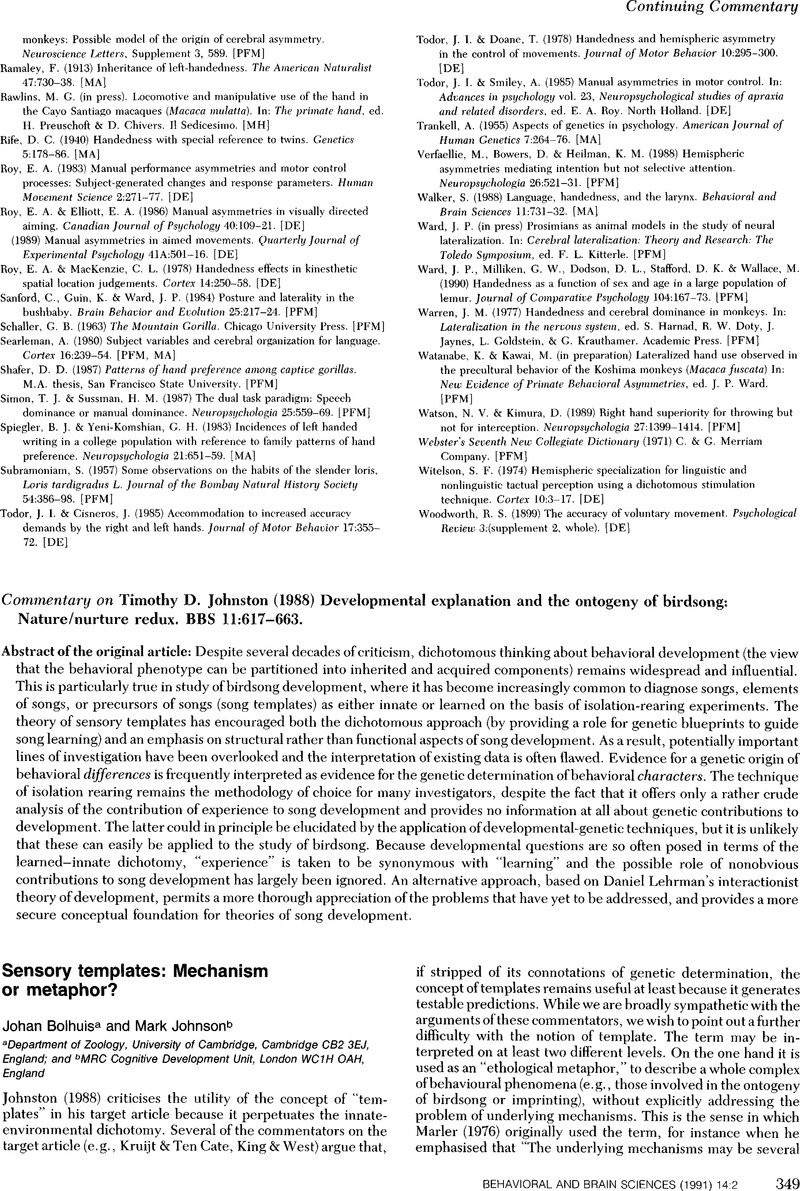No CrossRef data available.
Article contents
On the unmodifiability of views and the innateness of behavior
Published online by Cambridge University Press: 19 May 2011
Abstract
An abstract is not available for this content so a preview has been provided. Please use the Get access link above for information on how to access this content.

- Type
- Author's Response
- Information
- Copyright
- Copyright © Cambridge University Press 1991
References
Bolhuis, J. J., Johnson, M. H. & Horn, G. (1985) Effects of early experience on the development of filial preferences in the domestic chick. Developmental Psychobiology 18:299–308. [JB]CrossRefGoogle ScholarPubMed
Bolhuis, J. J., Johnson, M. H. & Horn, G. (1989) Interacting mechanisms during the formation of filial preferences: The development of a predisposition does not prevent learning. Journal of Experimental Psychology: Animal Behavior Processes 15:376–8. [JB]Google Scholar
Güttinger, H.-R. (1988) Template theory is heuristic in disentangling organism–environment interactions. Behavioral and Brain Sciences 11(4):633. [JB]CrossRefGoogle Scholar
Johnson, M. H. & Horn, G. (1988) Development of filial preferences in darkreared chicks. Animal Behaviour 36:675–83. [JB]CrossRefGoogle Scholar
Johnson, M. H., Bolhuis, J. J. & Horn, G. (1985) Interaction between acquired preferences and developing predispositions during imprinting. Animal Behaviour 33:1000–06. [JB]CrossRefGoogle Scholar
Johnston, T. D. (1987) The persistence of dichotomies in the study of behavioral development. Developmental Review 7:149–82. [rTDJ]CrossRefGoogle Scholar
Johnston, T. D. (1988) Developmental explanation and the ontogeny of birdsong: Nature/nurture redux. Behavioral and Brain Sciences 11(4):617–63. [JB]CrossRefGoogle Scholar
Lehrman, D. S. (1953) A critique of Konrad Lorenz's theory of instinctive behavior. Quarterly Review of Biology 28:337–63. [rTDJ]CrossRefGoogle ScholarPubMed
Lorenz, K. Z. (1965) Evolution and modification of behavior. Chicago University Press [rTDJ]Google Scholar
Marler, P. (1976) Sensory templates in species specific behavior. In: Simpler networks and behavior, ed. Fentress, J. C.. Sinauer. [JB]Google Scholar
Marler, P. (1984) Song learning: Innate species differences in the learning process. In: The biology of learning, ed. Marler, P. & Terrace, H. S.. Springer Verlag. [JB]CrossRefGoogle Scholar
Schneirla, T. C. (1956) Interrelationships of the “innate” and the “acquired” in instinctive behavior. In: L'Instinct dans le comportement des animaux et de I'homme, ed. Grassé, P. P.. Masson. [rTDJ]Google Scholar
Staddon, J. E. R. (1983) Adaptive behavior and learning. Cambridge University Press. [JB]Google Scholar
Van Valen, L. M. (1982) Homology and causes. Journal of Morphology 173:305–12. [LMV]CrossRefGoogle ScholarPubMed


